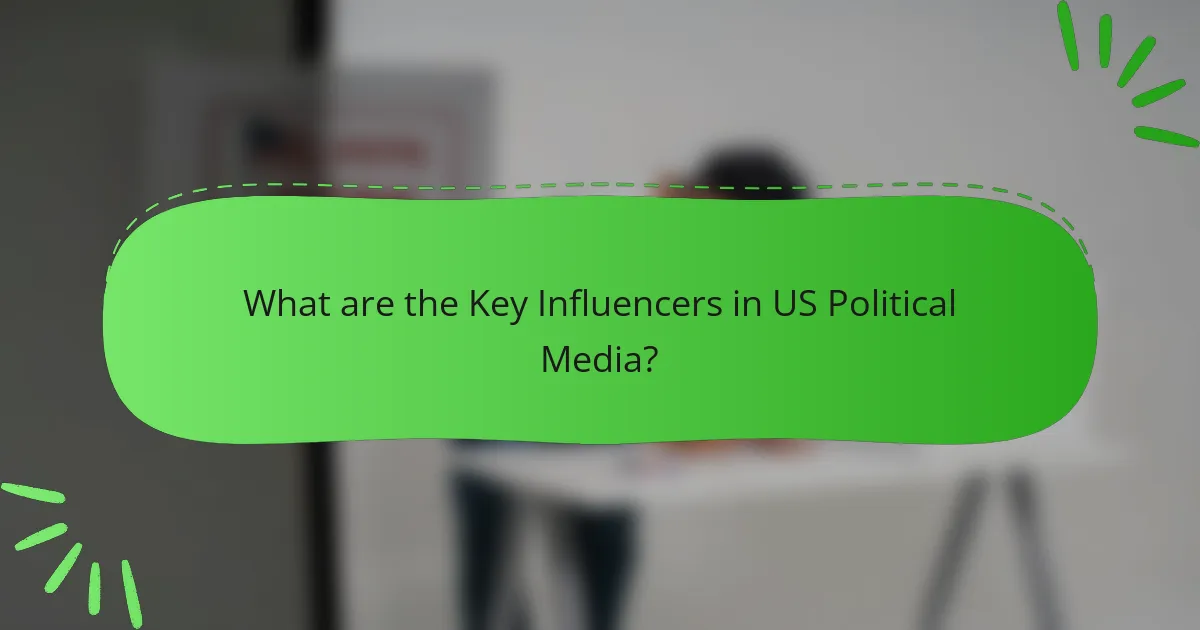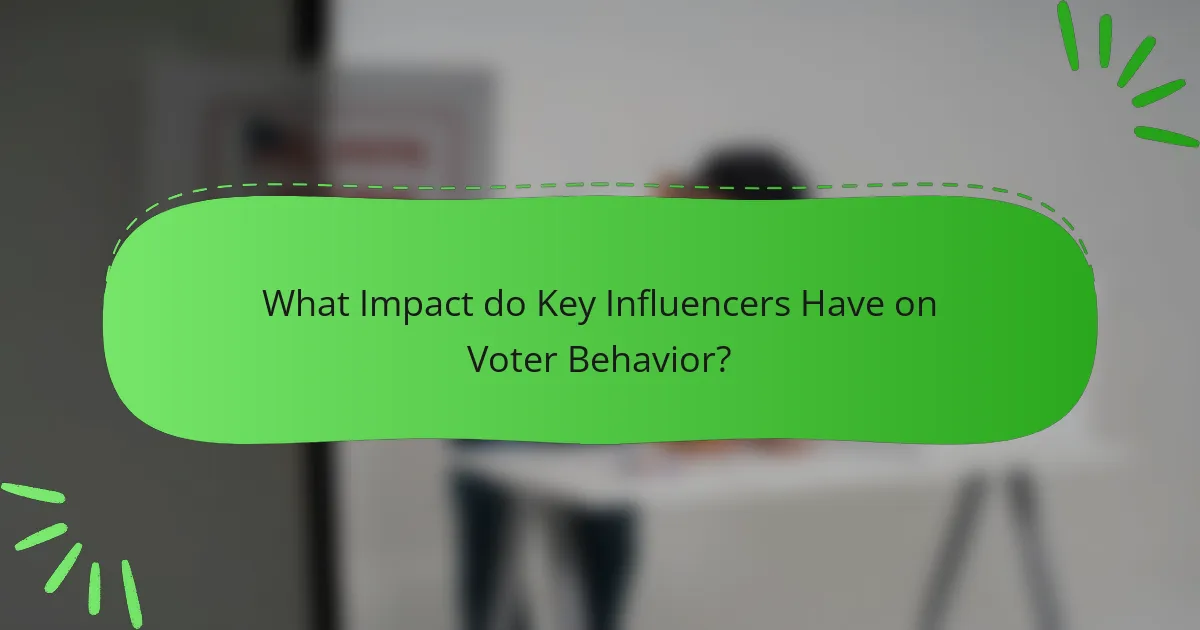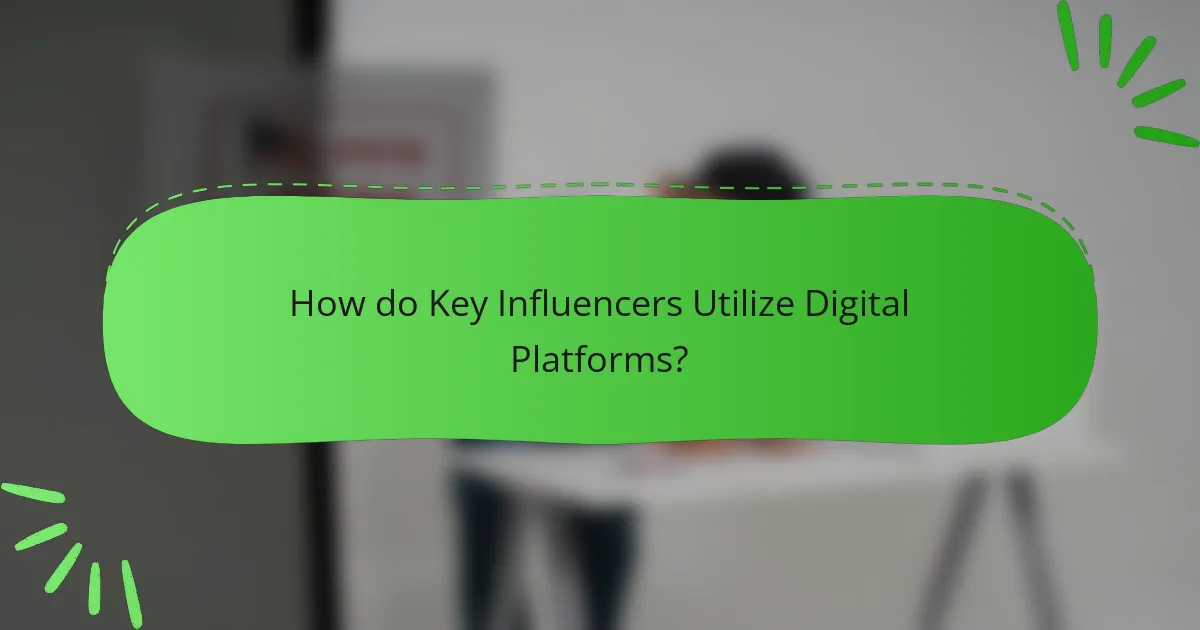Key influencers in US political media comprise major news networks, social media platforms, and influential journalists, all of which significantly shape voter behavior and public opinion. Prominent networks such as CNN, Fox News, and MSNBC provide extensive coverage that influences audience perceptions, while social media platforms like Twitter and Facebook facilitate direct communication between politicians and voters. Influential journalists, including figures like Rachel Maddow and Sean Hannity, have substantial followings that drive political discourse. Research indicates that media exposure, particularly through social media, can sway voter opinions and behaviors during elections, with a notable percentage of young voters actively engaging with political influencers online. These influencers utilize digital platforms to create relatable content, enhance voter motivation, and ultimately impact voter turnout and party loyalty.

What are the Key Influencers in US Political Media?
Key influencers in US political media include major news networks, social media platforms, and prominent journalists. Major news networks like CNN, Fox News, and MSNBC shape public opinion through their coverage. Social media platforms such as Twitter and Facebook amplify political messages and enable direct communication between politicians and voters. Influential journalists and commentators, like Rachel Maddow and Sean Hannity, have significant followings that impact political discourse. Research indicates that media exposure can sway voter opinions and behaviors during elections. The Pew Research Center reported that 62% of adults get news from social media, highlighting its role in shaping political views.
How do these influencers shape public opinion?
Influencers shape public opinion by leveraging their platforms to disseminate information and engage audiences. They often curate content that resonates with their followers’ values and beliefs. This targeted communication can sway perceptions on political issues. Studies show that social media influencers can significantly impact voter engagement and attitudes. For example, a 2020 study by the Pew Research Center found that 55% of young voters reported being influenced by social media content. Influencers create a sense of community and belonging, which can amplify their messages. Their endorsements or criticisms can lead to shifts in public sentiment. Overall, influencers play a crucial role in framing political discourse and mobilizing voter action.
What methods do they use to communicate their messages?
Key influencers in US political media communicate their messages through various methods. They utilize social media platforms such as Twitter and Facebook to reach a broad audience. Traditional media, including television and radio, also play a significant role in message dissemination. Additionally, influencers often engage in public speaking events to connect directly with voters. They may produce podcasts or video content to share their views in an accessible format. Research indicates that these methods enhance their visibility and impact on voter behavior. Studies show that social media engagement can significantly influence public opinion and voter turnout.
How do their backgrounds influence their perspectives?
Backgrounds shape perspectives through personal experiences and cultural contexts. Individuals from diverse socioeconomic backgrounds may have different views on policies affecting their communities. Education levels influence how people interpret political information. For example, higher education often correlates with a more critical view of media sources. Geographic location also plays a role; urban residents may prioritize different issues than rural residents. Family and community values further inform individual beliefs. Historical events experienced during formative years can leave lasting impressions on political views. Research shows that these factors collectively contribute to varying interpretations of political narratives.
Why is understanding these influencers important for voters?
Understanding influencers is important for voters because they shape public opinion and political discourse. Influencers often have large followings and can sway perceptions on key issues. Their endorsements can impact voter turnout and candidate support. For example, research shows that social media influencers can significantly affect young voter engagement. A study by the Pew Research Center found that 72% of teens rely on social media for news. This highlights the role of influencers in informing voter decisions. Recognizing their influence helps voters critically evaluate information and sources. This awareness can lead to more informed voting choices.
How can voters critically assess the information presented by these influencers?
Voters can critically assess information presented by influencers by verifying facts through credible sources. This involves cross-referencing claims made by influencers with established news outlets or academic studies. Voters should also evaluate the influencer’s background and expertise in the topic. Understanding potential biases is crucial; influencers may have political affiliations that color their perspectives. Analyzing the context of the information helps to determine its relevance and accuracy. Engaging in discussions with peers can provide diverse viewpoints and enhance understanding. Ultimately, voters should approach information with a questioning mindset to discern fact from opinion.
What role do these influencers play in the electoral process?
Influencers play a significant role in the electoral process by shaping public opinion and voter engagement. They often have large followings on social media platforms. This allows them to disseminate political messages rapidly and widely. Influencers can endorse candidates, promoting their platforms and policies. Their endorsements can sway undecided voters and mobilize supporters. Research shows that social media influencers can increase voter turnout by engaging younger demographics. For instance, a study by the Pew Research Center found that 50% of young voters are influenced by social media content. This demonstrates the tangible impact influencers have on electoral outcomes.

What Impact do Key Influencers Have on Voter Behavior?
Key influencers significantly shape voter behavior by affecting perceptions and engagement. They leverage their platforms to disseminate information and opinions. This can lead to increased voter turnout and shifts in public opinion. Research shows that social media influencers can mobilize younger voters effectively. For example, studies indicate that 50% of young voters follow political influencers online. Their endorsements can sway undecided voters and reinforce party loyalty. Additionally, influencers often create relatable content that resonates with their audience. This emotional connection can enhance voter motivation and participation.
How do influencers affect voter turnout?
Influencers affect voter turnout by mobilizing their followers and shaping political opinions. They use social media platforms to engage audiences on electoral issues. This engagement often translates into increased awareness about voting. Research indicates that young voters are particularly influenced by social media campaigns. According to a study by the Pew Research Center, 50% of young adults reported that social media impacted their likelihood to vote. Influencers can also provide information on registration and voting logistics. Their endorsements can lend credibility to candidates, swaying undecided voters. Overall, influencers play a significant role in energizing the electorate.
What strategies do they employ to mobilize voters?
They employ targeted outreach strategies to mobilize voters. These strategies include door-to-door canvassing, phone banking, and social media campaigns. Data analytics help identify potential voters based on demographics and voting history. Engaging content is created to resonate with specific voter segments. Grassroots movements are organized to build community support. Collaborations with local organizations enhance credibility and reach. Events and rallies are held to energize and inform supporters. Research indicates that personalized communication increases voter turnout by 20%.
How does their messaging resonate with different demographic groups?
Messaging resonates with different demographic groups by aligning with their values and concerns. For instance, younger voters often respond to messaging that emphasizes social justice and climate change. Older demographics may prefer messages focusing on economic stability and healthcare. Ethnic minorities tend to engage with content that addresses systemic inequality and representation. Research indicates that tailored messaging can increase voter engagement by 25% among targeted groups. Additionally, studies show that emotional appeals in messaging significantly enhance resonance across diverse demographics.
What are the psychological effects of political media influencers on voters?
Political media influencers significantly shape voter psychology. They can reinforce existing beliefs and attitudes among their audience. This phenomenon is known as confirmation bias. Influencers often frame issues in a way that aligns with their followers’ views. This framing can create echo chambers, limiting exposure to opposing perspectives. Emotional appeals are frequently used to engage voters. These appeals can lead to heightened feelings of anger or enthusiasm. Research indicates that social media influencers can sway public opinion significantly. A study by the Pew Research Center found that 62% of social media users get news from these platforms. This underscores their role in shaping political perceptions and behaviors.
How do emotional appeals influence voter decisions?
Emotional appeals significantly influence voter decisions by tapping into feelings rather than logic. Politicians often use rhetoric that evokes fear, hope, or anger. This strategy can create a strong connection between the voter and the candidate. Research shows that voters are more likely to support candidates who resonate emotionally. A study by the American Political Science Review found that emotional messaging can increase voter turnout by up to 20%. Emotional appeals can also overshadow factual information, leading to decisions based on sentiment rather than policy. Thus, emotional resonance plays a crucial role in shaping electoral outcomes.
What cognitive biases are often exploited by these influencers?
Influencers often exploit cognitive biases such as confirmation bias, social proof, and scarcity. Confirmation bias occurs when individuals favor information that confirms their preexisting beliefs. Influencers may present selective facts that align with their audience’s views, reinforcing those beliefs. Social proof is another bias where people look to others for cues on how to behave. Influencers leverage this by showcasing large followings or endorsements to validate their messages. Scarcity bias involves the perception that limited availability increases value. Influencers create urgency by suggesting that opportunities or products are in short supply. Research indicates that these biases significantly affect decision-making processes. For instance, a study published in the Journal of Consumer Research found that scarcity can lead to increased desire for products.

How do Key Influencers Utilize Digital Platforms?
Key influencers utilize digital platforms to amplify their messages and engage with audiences. They create content that resonates with their followers. This content often includes videos, blog posts, and social media updates. Influencers leverage platforms like Twitter, Instagram, and Facebook to share their perspectives. They can reach large audiences quickly through these channels. Data shows that 70% of teens trust influencers more than traditional celebrities. Influencers also collaborate with brands to promote political causes. This strategy enhances their credibility and expands their reach. By utilizing analytics, they track engagement and adapt their strategies accordingly.
What role does social media play in their influence?
Social media significantly amplifies the influence of key political figures in the U.S. Political media utilizes platforms like Twitter and Facebook to disseminate information rapidly. This immediacy allows influencers to shape public opinion in real-time. According to a Pew Research Center study, 53% of U.S. adults get news from social media. This statistic highlights the pivotal role social media plays in reaching voters. Influencers leverage social media to engage directly with their audience. They can create viral content that resonates with specific demographics. This targeted approach enhances their ability to mobilize voters.
Which platforms are most effective for political messaging?
Social media platforms are most effective for political messaging. Platforms like Facebook and Twitter enable direct engagement with voters. They allow for rapid dissemination of information. Instagram is effective for visual storytelling and reaching younger demographics. YouTube serves as a platform for in-depth content and video messaging. Research shows that 69% of adults in the U.S. use Facebook, making it a key platform for political outreach. Data from the Pew Research Center indicates that Twitter is influential in shaping political discourse.
How do influencers adapt their strategies for different platforms?
Influencers adapt their strategies for different platforms by tailoring content to each platform’s unique features. On Instagram, they focus on visual storytelling through high-quality images and short videos. Twitter requires concise messaging, often utilizing trending hashtags to engage followers. YouTube allows for in-depth content, enabling influencers to create longer videos that explore topics comprehensively. TikTok emphasizes creativity and trends, prompting influencers to produce short, entertaining clips that resonate with younger audiences. Each platform’s audience demographics also influence content style and tone. For example, LinkedIn demands a more professional approach, while Snapchat favors casual and spontaneous content. Adapting to these nuances helps influencers maximize engagement and reach across platforms.
What are the challenges faced by influencers in political media?
Influencers in political media face several challenges. One significant challenge is combating misinformation. Misinformation can undermine their credibility and influence. Another challenge is navigating platform algorithms. These algorithms can limit the visibility of political content. Influencers also deal with audience polarization. This polarization can lead to backlash from opposing viewpoints. Additionally, regulatory scrutiny poses a challenge. Influencers must comply with advertising laws and transparency requirements. Lastly, maintaining authenticity is crucial. Audiences expect genuine engagement, which can be difficult under pressure.
How do misinformation and fact-checking affect their credibility?
Misinformation undermines credibility by spreading false information. This can lead to distrust among audiences. Fact-checking, on the other hand, enhances credibility by verifying claims. Studies have shown that fact-checked information is more likely to be trusted. For example, a 2020 study by the Pew Research Center found that 68% of Americans believe fact-checking improves the reliability of news. Consequently, consistent fact-checking can help restore trust in media sources affected by misinformation.
What strategies do they use to maintain trust among their followers?
Key influencers in US political media maintain trust among their followers through transparency and consistent communication. They openly share their sources and reasoning behind their opinions. Regular engagement with their audience builds a sense of community and loyalty. Fact-checking their claims and correcting misinformation reinforces their credibility. Providing balanced perspectives on controversial issues demonstrates fairness. They often highlight their personal values, aligning them with their audience’s beliefs. This alignment fosters a deeper connection and trust. Research shows that influencers who prioritize these strategies see higher levels of follower trust and engagement.
What can voters do to navigate the influence of political media?
Voters can critically evaluate political media by cross-referencing multiple sources. This practice helps identify biases and misinformation. Engaging with diverse viewpoints enhances understanding of issues. Fact-checking claims made in political media builds informed opinions. Utilizing reputable fact-checking organizations strengthens the accuracy of information. Participating in discussions with others broadens perspectives on political topics. Understanding the motivations behind media narratives aids in discerning truth. These strategies empower voters to make informed decisions in the electoral process.
Key influencers in US political media, including major news networks, social media platforms, and prominent journalists, significantly shape public opinion and voter behavior. These influencers utilize various communication methods to engage audiences, often tailoring their messaging to resonate with specific demographic groups. Research indicates that their endorsements and emotional appeals can mobilize voters, particularly younger demographics, and impact electoral outcomes. Understanding these dynamics is crucial for voters to critically assess the information presented and navigate the influence of political media effectively.